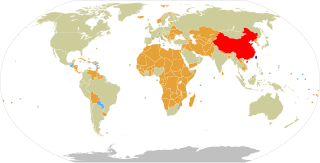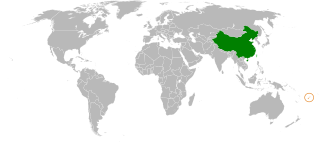
Kiribati is a full member of the Commonwealth, the IMF and the World Bank, and became a full member of the United Nations in 1999. Kiribati hosted the Thirty-First Pacific Islands Forum in October 2000. Kiribati has Least Developed Country Status and its interests rarely extend beyond the region. Through accession to the Lomé Convention, then Cotonou Agreement, Kiribati is also a member of the African Caribbean and Pacific Group. Kiribati maintains good relations with most countries and has particularly close ties to Pacific neighbours Japan, Australia, and New Zealand. Kiribati briefly suspended its relations with France in 1995 over that country's decision to renew nuclear testing in the South Pacific.

The Republic of China (ROC), often known informally as Taiwan, currently has formal diplomatic relations with 12 of the 193 United Nations member states and with the Holy See, which governs Vatican City, as of 20 April 2023. In addition to these relations, the ROC also maintains unofficial relations with 59 UN member states, one self-declared state (Somaliland), three territories (Guam, Hong Kong, and Macau), and the European Union via its representative offices and consulates under the One China principle. The Government of the Republic of China has the 31st largest diplomatic network in the world with 110 offices.
This article is about the foreign relations of Tuvalu. From 1916 to 1975, Tuvalu was part of the Gilbert and Ellice Islands colony of the United Kingdom. A referendum was held in 1974 to determine whether the Gilbert Islands and Ellice Islands should each have their own administration. As a consequence of the referendum, the separate British colonies of Kiribati and Tuvalu were formed. Tuvalu became fully independent as a sovereign state within the Commonwealth on 1 October 1978. On 5 September 2000, Tuvalu became the 189th member of the United Nations.

Oceania is, to the People's Republic of China and the Republic of China, a stage for continuous diplomatic competition. The PRC dictates that no state can have diplomatic relations with both the PRC and the ROC. As of 2019, ten states in Oceania have diplomatic relations with the PRC, and four have diplomatic relations with the ROC. These numbers fluctuate as Pacific Island nations re-evaluate their foreign policies, and occasionally shift diplomatic recognition between Beijing and Taipei. The issue of which "Chinese" government to recognize has become a central theme in the elections of numerous Pacific Island nations, and has led to several votes of no-confidence.

Kiribati and the United States have diplomatic relations.

The Republic of the Fiji Islands was the first Pacific Island country to establish diplomatic relations with the People's Republic of China, in 1975. China established an embassy in Fiji in 1976, and Fiji opened its embassy in China in 2001.





